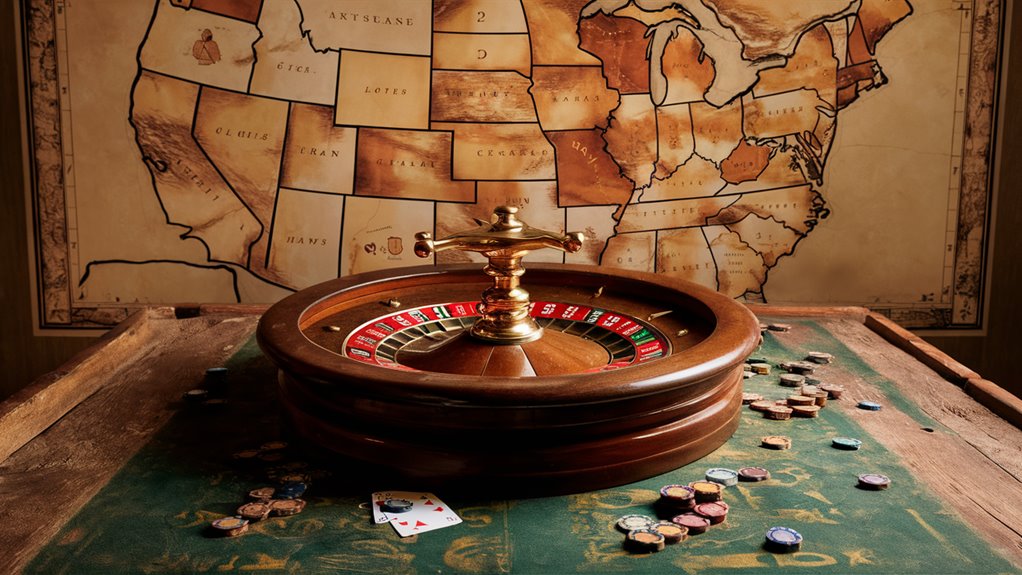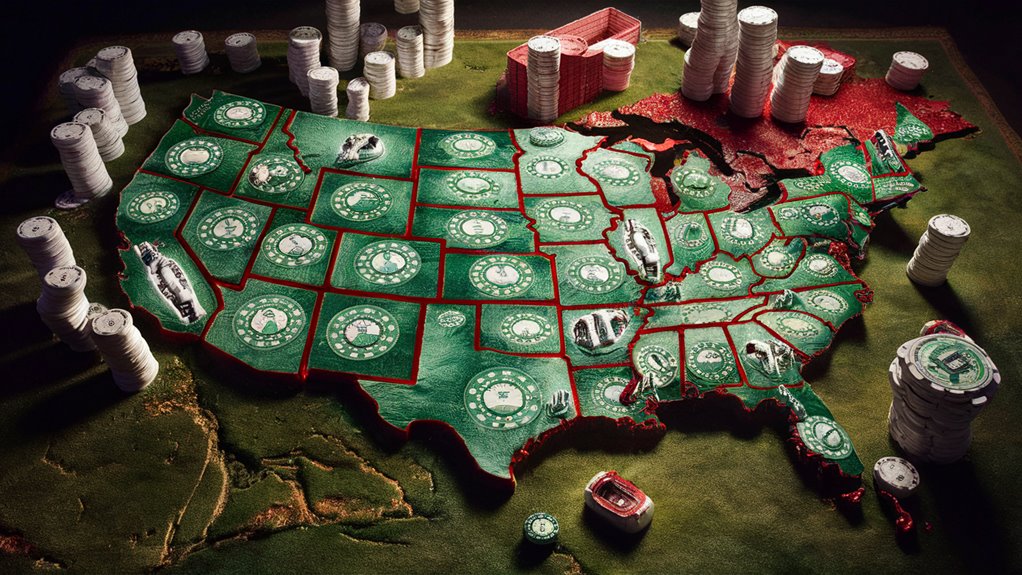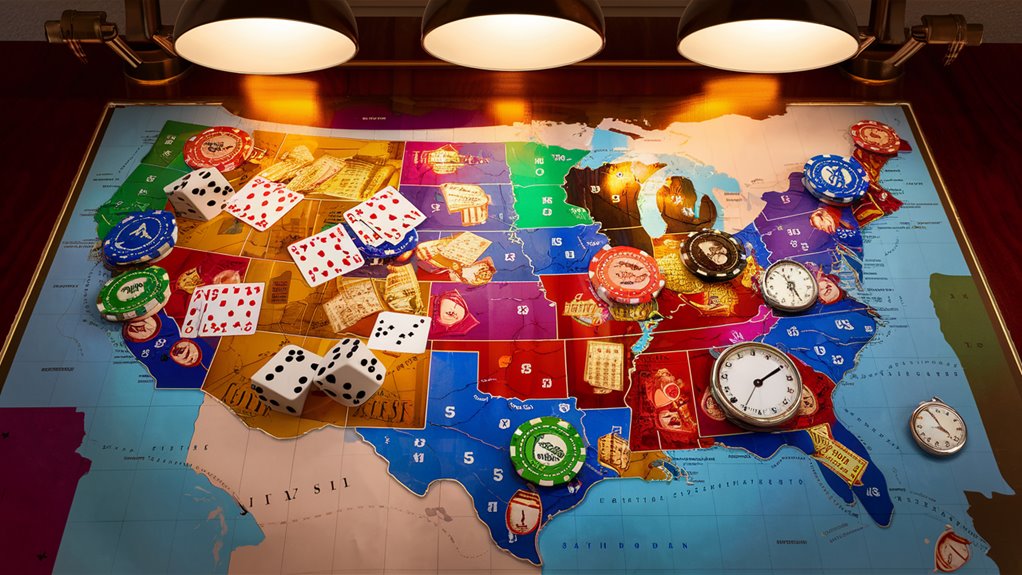All You Need to Know About U.S. Gambling Laws: Each State’s Rules

Federal and State Rules for Games
The gambling rules in the United States are made up of a big mix where each state can say what happens in its area. This setup includes federal, state, and local rules, which make different laws in different places.
How Casinos Work
Nevada and New Jersey are top spots for full casino game options. On the other side, Utah and Hawaii do not allow any kind of gambling. This makes a mix of chances and limits for gambling in the states. 온카스터디 안전업체 보기
Sports Bets and Online Games
More sports betting is seen all over America, with over 30 states now allowing it. Yet, online casino games are only in six states, showing that not all are open to this online setup. Each area has its own rules and must-get licenses.
How Tribal Gambling Works
Native American gambling is set by deals between states and tribes in 29 states. This big part of the market makes over $37 billion every year, helping both tribal areas and state money. Tribal casinos follow both federal rules and the deals made with states.
Sticking to The Rules
All gambling spots must follow strict federal rules against money-laundering and put in place detailed safe gambling rules. These rules help keep everything right and safe for players in all kinds of gambling.
Different Rules in Different States
How rules are made varies a lot by area, with each state setting up its own:
- License needs
- Tax setups
- How things must run
- How players are kept safe
- How rules are used
How U.S. Gambling Started and Changed
The Story of How US Gambling Laws Came to Be
Early Days and First Gambling
The start of American gambling laws goes back to when public lotteries helped pay for big projects and schools. These first gambling events helped make famous universities and funded big works all over the growing country.
Change in the 1800s
A big shift in the 1800s made many push for total stops to gambling. Most states put in complete stops on gambling, but not all areas used this rule the same way. This time made a big change in how America saw gambling.
Nevada’s Big Move
Nevada letting casinos open in 1931 was a huge step in American gambling. This big law move helped with money problems from the Great Depression and started the way for how we think about casinos in America today.
More Gambling Comes
The later 1900s saw a lot of changes in gambling laws all over the country:
- New Jersey’s casino start in 1976 in Atlantic City
- The big law for Native American casinos in 1988
- Many states starting lotteries
- More Native American casinos in many states
New Times for More Betting
The start of online betting sites in the 1990s brought new hard steps for laws. A new law in 2006 for online betting set up new ways to watch and keep online bets safe while making sure players were treated right in the growing online place.
Different Casino Rules in Each State
Specific Casino Rules: A Full Guide
How The Rules Work
Casino rules across the United States are a big mix of each state’s laws and watching how things are run. Each state can make and watch its own rules, creating different ways of handling and watching gambling.
Leaders in Gaming Rules
Nevada and New Jersey lead with deep rules for casinos, using high-level systems that cover:
- Detailed license steps
- Strict ways of running
- High-level safety steps
- Careful money tracking
- Tight checks on workers
States with Tight Limits
Some states keep tight caps on casino work:
- Utah and Hawaii have full stops on casino gambling
- Maine and Arkansas limit games to only some places
- States with few licenses keep casino numbers low with strict permits
Looking at Tribal Gambling
Multi-Layer Rules for Tribes
Tribal gaming spots work under a mix of rules:
- Federal laws give a framework
- State-tribe deals set how they work
- Money share deals state who gets what
Big Tribal Gambling Places
Oklahoma and California are big for tribal gaming, with:
- Deals made just for them
- Rules just for their markets
- Different ways to split money
- Specific ways they must run
What Casinos Must Follow
Modern watching of casinos includes:
- Rules against money-laundering
- Safe gambling steps
- Checks on tech systems
- Needs for money checks
- Ways to keep players safe
How Betting on Sports is Seen
The Start of Legal Sports Betting in America

Big Sports Betting Changes
The big court choice in 2018 changed sports betting in America by ending federal limits. This big choice let states make their own sports betting rules, making a mix of ways to handle it across the country.
How Each State Handles Betting
By 2023, over 30 states have sports betting, with different ways of running it and rules. Big differences include:
- Mobile versus Shop Betting Options
- Different Tax Setups
- Different License Needs
- Various Ways of Running It
States Known for Their Rules
New Jersey shows a full setup, offering both shop and mobile betting through many workers. Meanwhile, New York keeps its own money models with high mobile betting taxes. Other places keep bets to just casino spots only.
Important Parts of The Rules
Must-Haves in The Rules
States usually ask for:
- Checks on age (21+)
- Technology to check where you are
- Safe gambling steps
- Stops on some types of bets
How Colleges Fit Into Betting Rules
College betting rules change a lot by state:
- Limits on betting on teams from the same state
- Limits on where you can bet
- Stopping bets on campuses
- Keeping college players safe
These full rules help keep the market right while keeping players safe and making sure the sports betting scene stays fair as it grows.
Online Gaming Rules
Online Gaming Rules in the United States
A Look at Federal Rules
The United States has a big mix of online gaming rules, which include federal laws, state rules, and tribal gaming laws. Two big federal laws – the law against illegal online bets (UIGEA) and the Wire Act – set up the main rules for online bets between states.
Big Laws from The Federal Side
The UIGEA stops gambling businesses from dealing with money from illegal internet bets. The Wire Act puts limits on sports betting chats between states, making a big set of rules for online betting.
State Power and Rules
State gaming groups have the main say in what happens in their areas. Right now, six states let online casino games:
- New Jersey
- Pennsylvania
- Michigan
- West Virginia
- Connecticut
- Delaware
What States Ask For
State setups ask for putting in:
- Systems to check where you are
- Checks on age
- Safe gambling steps
- Detailed tax setups
- License needs
Watching and Making Sure
State gaming groups keep a close watch on how platforms stick to local rules, while federal groups look at:
- Watching deals between states
- Steps against money-laundering
- Watching how money moves
- Keeping an eye on gaming across borders
As rules grow and get better, states make stronger ways to keep players safe and setup rules for online gaming spots.
Rights for Tribal Gaming
Understanding Tribal Gaming Rights and Rules
The Rules for Native American Gaming
Native American tribes can run gaming on their lands under the big 1988 law for Native American gaming (IGRA). This federal law sets up three types of gaming:
- Type I Gaming: Old tribe games
- Type II Gaming: Bingo and simple card games
- Type III Gaming: Full casino games like slots and table games
Deals and Watching by States and Tribes
Type III gaming needs good deals between states and tribes that set up:
- Rules to follow
- Money share deals
- How things must run
- Where it all happens
The National Indian Gaming Group (NIGC) gives federal watching, making sure rules are followed and protecting money made from gaming.
Money and How It’s Shared
Money from tribal gaming must be used for:
- Tribal government work
- Money making plans
- Helping the community
- Giving to good causes
Numbers in The Market Now
The tribal gaming market is a big part of the economy:
- Makes over $37 billion every year What Are the Best Payment Methods for Online Gambling?
- Has over 500 gaming spots
- Works in 29 states
- Is a main way tribes make money
Who Has The Say
Tribal gaming spots mostly follow:
- Tribal laws
- Federal rules
- Limited state watch through deals made
This mix of who is in charge makes sure both tribal rights and rule following are kept while getting the most money help for native communities.
